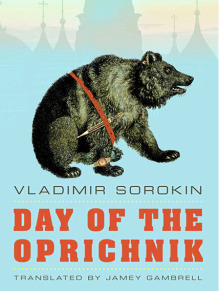 by Vladimir Sorokin
by Vladimir Sorokin
Russia. 2007. 208 pages.
Andrei Danilovich Komiaga is a powerful man in a dystopian Russia in the year 2028. As a high-ranking Oprichnik, he is an elite thug in the service of the czar, responsible for crushing dissent and eliminating, through violence and intimidation, the political enemies of His Majesty. Like all Oprichniki, he wears the finest clothes and an expensive wristwatch, drives his red government-issue Mercedes in the official-business-only express lane, and tops off a successful day of raping and killing with a long night of drug use and debauchery. But government work has its challenges, especially when his nation’s moral fiber is at stake. Playfully reimagining Ivan the Terrible’s feared Oprichnik operatives in a future Russia that has turned inward (save for its dealings with China, the world’s major power) and lapsed into authoritarianism, Sorokin’s novel packs a hefty satirical punch that will show American audiences why the author has been so controversial in Russia . . .
About the author
 Vladimir Georgievich Sorokin (born 7 August 1955 in Bykovo, Moscow Oblast) is a contemporary postmodern Russian writer and dramatist, one of the most popular in modern Russian literature. In 1972 he made his literary debut with a publication in the newspaper Za Kadry Neftyanikov (lit. For the petroleum industry manager). He studied at the Gubkin Institute of Oil and Gas in Moscow and graduated in 1977 as an engineer. After graduation he worked for one year for the magazine Change, before he had to leave due to his refusal to become a member of the Komsomol.
Vladimir Georgievich Sorokin (born 7 August 1955 in Bykovo, Moscow Oblast) is a contemporary postmodern Russian writer and dramatist, one of the most popular in modern Russian literature. In 1972 he made his literary debut with a publication in the newspaper Za Kadry Neftyanikov (lit. For the petroleum industry manager). He studied at the Gubkin Institute of Oil and Gas in Moscow and graduated in 1977 as an engineer. After graduation he worked for one year for the magazine Change, before he had to leave due to his refusal to become a member of the Komsomol.
Throughout the 1970s, Sorokin participated in a number of art exhibitions and designed and illustrated nearly 50 books. Sorokin’s development as a writer took place amidst painters and writers of the Moscow underground scene of the 1980s. In 1985, six of Sorokin’s stories appeared in the Paris magazine A-Ya. In the same year, French publisher Syntaxe published his novel Ochered’ (The Queue).
Sorokin’s works, bright and striking examples of underground culture, were banned during the Soviet period. His first publication in the USSR appeared in November 1989, when the Riga-based Latvian magazine Rodnik (Spring) presented a group of Sorokin’s stories. Soon after, his stories appeared in Russian literary miscellanies and magazines Tretya Modernizatsiya (The Third Modernization), Mitin Zhurnal (Mitya’s Journal), Konets Veka (End of the Century), and Vestnik Novoy Literatury (Bulletin of the New Literature). In 1992, Russian publishing house Russlit published Sbornik Rasskazov (Collected Stories) – Sorokin’s first book to be nominated for a Russian Booker Prize. In September 2001, Vladimir Sorokin received the People’s Booker Prize; two months later, he was presented with the Award of Andrei Bely for outstanding contributions to Russian literature.
Buy this book!
Day of the Oprichnik is available for immediate purchase via these links to our Amazon.com and Amazon.de shops. When you make a purchase via this website, a percentage of the price goes right back into site maintenance and development. Thanks for the support!
The Washington DC chapter discussed this book today. It was one of those rare circumstances where we were pretty much in agreement about the book. Most of us felt as if we weren’t sufficiently knowledgable about Russian current events and Russian history to “get it” at the level a Russian person would. We all felt the book was much better suited to a Russian reader, or one with a high level of familiarity with Russian politics and history. While the satire came through, we knew we were missing a lot of subtleties…and perhaps some main points, too! There was also some dismay over the level of violence in the book. We wanted to know more about how the author’s books are received in Russia and elsewhere. We were especially curious about how the Berlin chapter received the book…so let us know!
Berlin was split, with a large part of that split attributed to the German translation (which was apparently horrible). We noted that, according to the NYTimes, Sorokin wrote this in one month — and it read at points like a political spew. Yes, there were some who also felt that the story probably had a lot more to say to those raised with all of its literary and cultural allusions. Nevertheless, there were two of us who found the absurdist satire extremely well-done (applauding the English translator accordingly) and relevant beyond Russian society (that is, to governments that praise culture while destroying its treasures, speak about “the people” while disempowering and dismissing them, and otherwise violently suppressing dissent in defense of a exploitative, small ruling class) .
Thanks for lending me the English translation which I have read and found indeed a very good piece of work. No idea why that German publisher printed this appalling translation! It is very difficult to translate, but a good translator will be able to do the job… Anyway, although the English version made me laugh a few times, it has not changed my mind of Oprichnik being an awful book 😉 And this is with a background of knowing the country pretty well. I am making inquiries about its reception in Russia and can let you know if you’re interested.